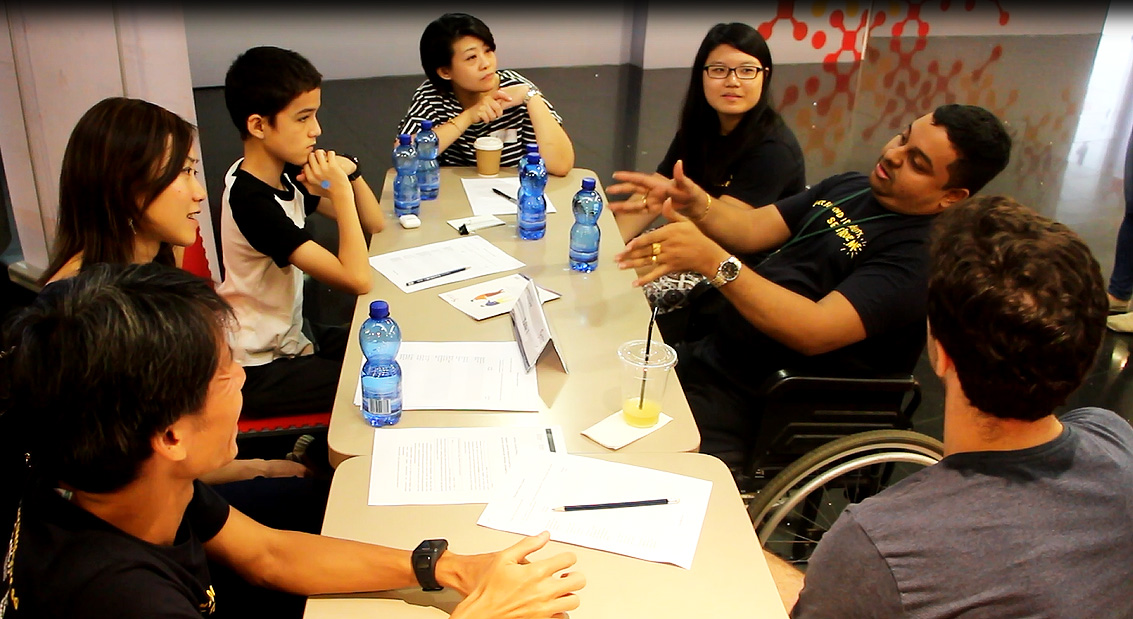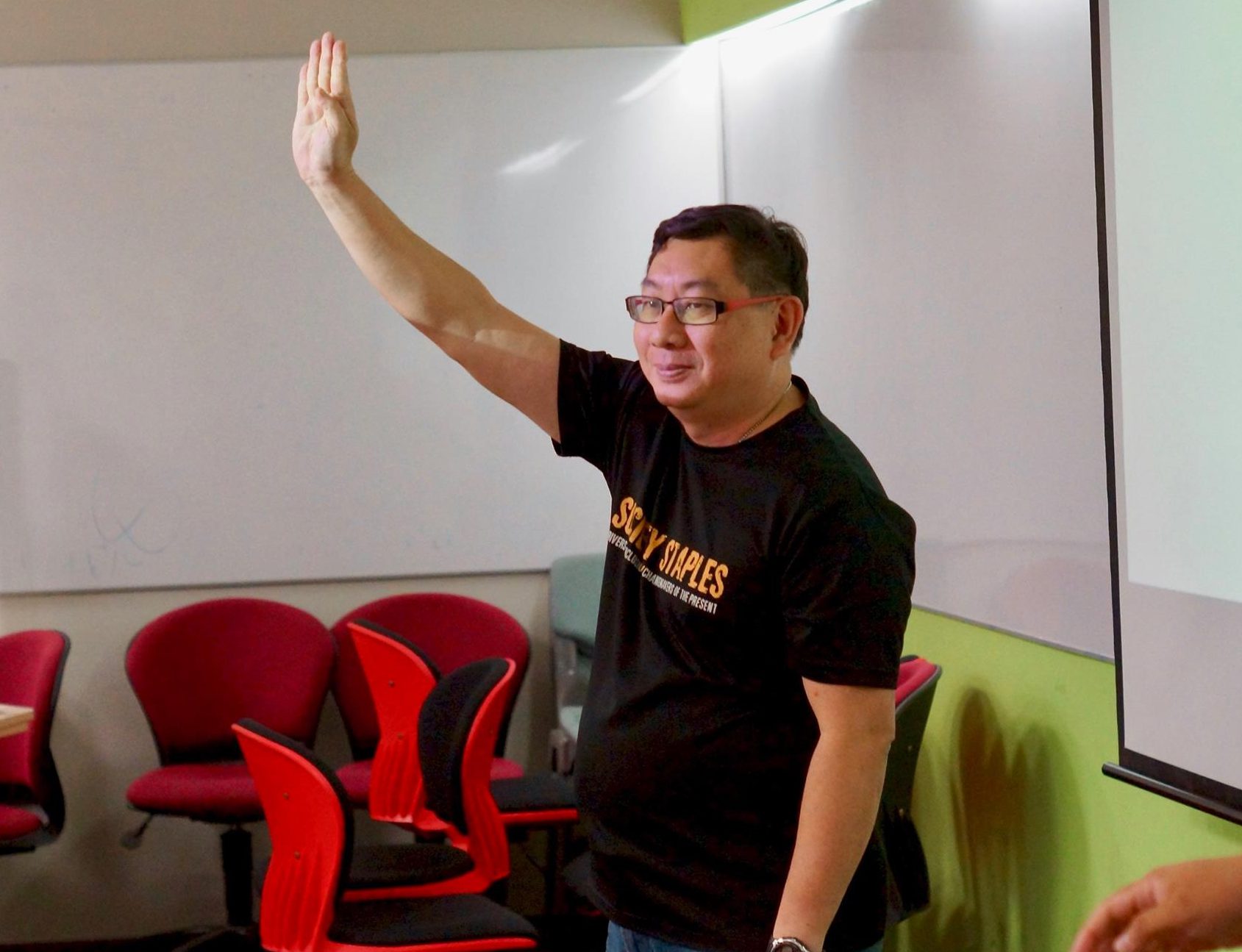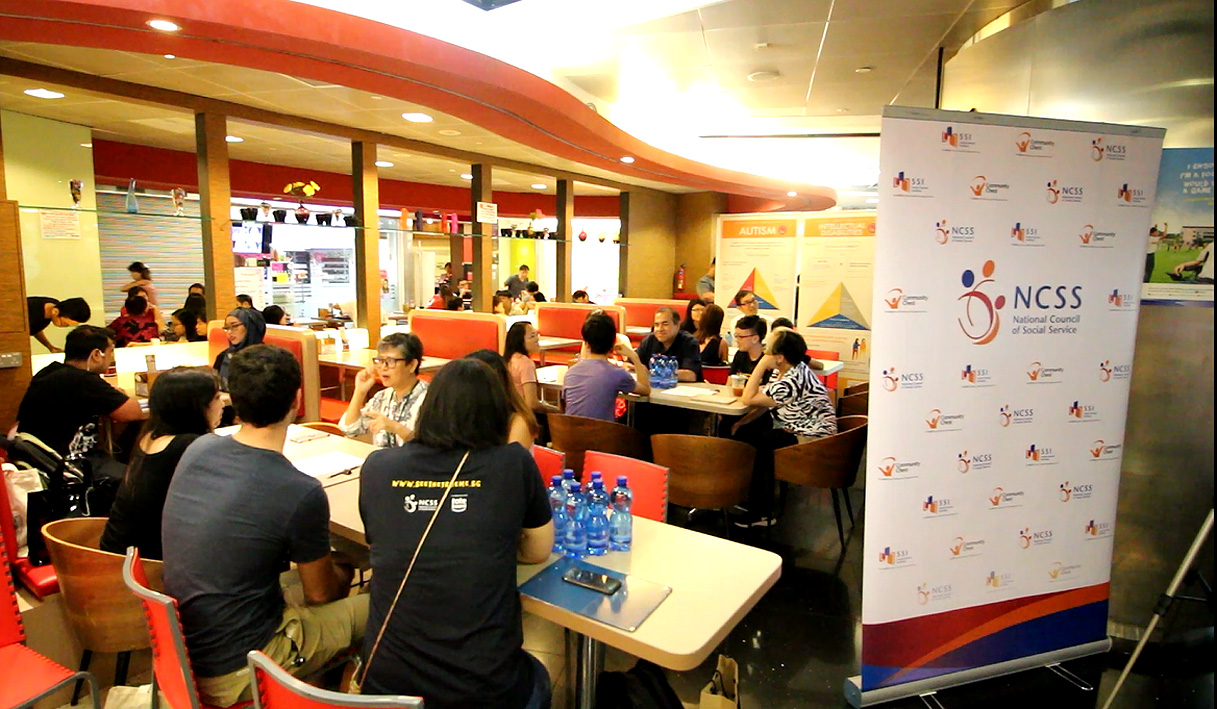I first heard about the Human Library a few years ago — several of its sessions were quite widely publicised.
I remember thinking it was an interesting concept: participants gathered in small groups over 20-minute sessions to conduct mini "group interviews" with a "book" — a person with a story to tell.
This story could be a dramatic or traumatic life experience, a lifelong condition one has or even an interesting life choice or occupation.
You could think of it as an in-person "Ask Me Anything", but it's not recorded and is done with a small group of people.
My chance to visit and, well, study, in a human library came when I was invited to one of these sessions — in this case, it was organised by the National Council of Social Service (NCSS), in collaboration with volunteers from the Human Library.
It was a Saturday afternoon, and I showed up half an hour late, regrettably, after being stuck at home wading through some urgent editing work, so I missed the starting briefing.
Thankfully, though, there was so much I learned from the two hours I spent, a little of which I attempt to share below:
 Photo courtesy of NCSS
Photo courtesy of NCSS
How to better support people with disabilities
I happened to arrive in between the first and second session (out of four altogether), so I slot myself in with a group that was gathering at a line of joined tables. Seated in the middle was a man in a wheelchair — my first book, Navin.
Navin has cerebral palsy (CP), which he explained to us quite early on is:
✓ not contagious
✓ not genetic, and
✓ not degenerating (meaning it doesn't get worse over the years, although it does exacerbate other medical conditions a CP sufferer might have, rendering his or her quality of life and overall well-being vastly impaired).
He said he was born premature, and that resulted in the development of his condition, an incurable neurone disorder.
Navin is quite an ambassador not just for people with CP, but also folks with all kinds of disabilities and conditions, including the blind and the deaf. He not only does research into issues of disability and inclusiveness, but also facilitates academic discussion and panels on these topics.
He says matter-of-factly, "If I want to champion this, I need to know these things!"
Navin adds that in Singapore, the attitude people have toward people with CP is, "This is your problem, (and) you have to find a way to work it out".
This does lend into our national narrative and philosophy of self-sufficiency. But, he explains, it can make life pretty difficult for folks like him who could certainly benefit from a small change in thinking.
In Europe, for instance, where he has been on several occasions as a representative of Singapore to United Nations gatherings on these topics, disabilities are thought of as part of a person's identity.
"The question here is, how will society evolve so that I can move forward without barriers?"
He brings up Sweden as an example, where when it comes to new government housing, the person purchasing the home is asked if they need a chair lift for the stairs. If the homeowner says he or she needs it, the government will subsidise the incorporation of this additional feature into the home.
In other words, it's in the consciousness of the Swedish government to think first for persons with disabilities when planning.
One thing did strike me, though, from Navin's sharing — it was that for many years of his life, he said he wondered when society was going to change, or when he would see a change.
Until all of a sudden it clicked for him, and instead, he went, "What am I doing about this?"
How to be present
 Photo courtesy of NCSS
Photo courtesy of NCSS
The reason I have so much on Navin's sharing is I was not stopped from writing down notes from the "reading". Unfortunately, and perhaps fascinatingly, I discovered in what initially felt like an unpleasant manner that I actually wasn't supposed to do that.
Courtesy, no less, of my second book, titled Timothy, whom I had shuffled over to sit down in front of in anticipation of my next "book reading".
The second I attempted to put pen to paper, he turned his head strongly, eyes darting in the direction of the ink drifting out of my pen onto my notebook lines, and chided me sharply, "Nonononono, no notes, no writing! Erase that, cancel that! No writing!"
As he said this, one arm shot out, and a thin index finger pointedly aimed itself at the few words beyond his name scribbled on my notebook. For a moment, I thought of trying to explain that I simply wanted to recall accurately what he said, but I decided to apologise and give this a go — just being present.
Timothy has autism, you see, and I would later go on to understand that it is easier for him to operate within defined rules and boundaries, rather than having to deal with strange deviations like what I was attempting, over and above everything else that is beyond his control.
And of course, I wanted him to be comfortable, so no writing it would be.
[related_story]
Timothy was dressed to give a lecture, not for an intimate small-group sharing session, and his bright orange tie showed just one facet of his enthusiasm in having the opportunity to be a book.
His was a very illuminating session indeed — like Navin, Timothy said his parents were not psychologically prepared for him to have autism. He says they tried every possible conceivable "cure" they learned or heard about (which, of course, didn't work), and were also in denial about his condition — he was only diagnosed when he was five, and did not speak till he was 10.
Timothy said he was a very angry child. He shares that he still has holes in his wall that he made in various fits of fury from his youth, which he has left unfixed to remind him of his not-so-distant past.
He explains that people with autism pick up way more things than the rest of us do — they see more, they hear more, all their senses are heightened, and so they end up struggling with the overwhelming and constant flood of information they receive.
That's why sometimes they show physical ticks, or make noises or hum (this is termed stimming), because those are things they can control and produce themselves, which help them to retain calmness and a sense of control.
I was surprised by how eloquent and polished he was in his delivery, hardly showing signs of his autism, and he had what sounded like a very well thought-through and rehearsed sharing about his life, experiences and views with us, which we decided would be best to let him get through before opening with questions from small cards placed on the table as conversation starters.
Unfortunately, I am unable to confidently recall the details of what we talked about, but all things considered, Timothy looked really well put-together and socially-adjusted. In fact, he now works as a tutor, and he teaches kids who also have autism — undoubtedly the best-placed person to do so.
How to talk to a deaf person
 Photo via Society Staples Facebook page
Photo via Society Staples Facebook page
My last book was an interesting one — Daniel was not officially one of the books "on display", per se, but he allowed me to write about our one-on-one conversation after the main library session had ended. Before him, I spoke to his longtime friend and collaborator, Ryan, whom I "read" as a caregiver to his younger brother, who has Williams' Syndrome.
Daniel has been deaf (not "hearing-impaired", mind you, because that term is rude) for pretty much all 47 years of his life. In one ear, he has total deafness, while in the other, he has about 25 per cent of its ability to hear, so he uses a hearing aid that helps to magnify the sounds it can pick up.
He communicated with me partly through sign language with Ryan, who translated my questions to him in sign language too, and partly by articulating words on his own. His speech is stilted, and limited to simple words, because sign language vocabulary remains small — and in many ways, I feel, too small to accommodate the many things he has to say.
Daniel and his parents spent his early growing-up years communicating via signals and pointing at things, and he was only sent to a special school when he was 10, because they didn't know about the existence of sign language or schools that taught it.
He never spoke till he was a teenager, but he also didn't realise he was deaf because nobody told him he was supposed to be hearing sounds and producing them.
He says he hasn't had an easy journey, and was always disciplined harshly in school because he was slow in picking up sign language and lip-reading — both of which he does very effectively now, though, of course.
The nice thing, though, is he is now involved in teaching sign language classes with interested members of the public under Society Staples, a Singaporean organisation Ryan founded. He led his own workshop for the first time last month, and his students gave rave reviews like this one:
And yes, he is planning to marry his longtime girlfriend, who is also deaf and whom he met on Facebook :)Of course, it goes without saying that I came away from the Human Library that evening with a new perspective. Many, in fact — I know now that when speaking to a deaf person through a sign-language interpreter, I should speak slowly and with simpler words so that it's easier for the person I'm speaking to to read my lips and also for the interpreter to translate what I say.
I know that when speaking to a person who has autism, I should not let myself get bothered by his or her stimming, speak to them as I would any other person, and not be patronising — same goes for folks with CP, of course — but to also be patient, because autism and CP affect the people who have them in different ways.
And there is no better way to discover all these things than to meet and have a meaningful conversation with every one of these wonderful people, to authentically appreciate and love who they are, in their identities, and in their beings.
Here are some unrelated articles you totally should check out next:
Best nights-out places for NSFs who want to spend less and save more
How young people can grow their wealth, according to the experts
I went without my wallet for a day and didn’t starve or die on the streets
Here are some awkwardly unnecessary things Singaporeans do in front of persons with disabilities
Top photo courtesy of NCSS
If you like what you read, follow us on Facebook, Instagram, Twitter and Telegram to get the latest updates.
